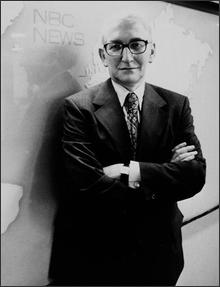 Yes, this is primarily a radio blog, but - as an NBC Historian - I would be remiss not to mourn the passing of Reuven Frank, who was a president of NBC News, and an incredibly important guy in broadcast news history.
Yes, this is primarily a radio blog, but - as an NBC Historian - I would be remiss not to mourn the passing of Reuven Frank, who was a president of NBC News, and an incredibly important guy in broadcast news history.I am a bit too young to remember Huntley and Brinkley's nightly show - Reuven was responsible not only for the innovative telecast, but for their pairing - but I do remember the seemingly nightly mentions of dead American boys from Vietnam. And I certainly remember "Good night, David..." "Good night, Chet" - although Reuven later pooh-poohed that particular innovation, despite it becoming a major catch-phrase (as he was quoted in Jeff Kisseloff's fine oral history of television The Box, one of the most fun and readable broadcast history books ever published).
Kansas City Star writer Aaron Barnhart hails Reuven for the great 1980's night-owl classic NBC News Overnight, but I most treasure the even-more-infrequently remembered Weekend, a monthly (!) NBC newsmagazine that ran Saturday nights at 11:30 PM, alternating with the earliest days of Saturday Night Live, hosted by Linda Ellerby and Lloyd Dobbins. I believe this was the show where Linda coined her famous "...and so it goes" tag, and I also believe the show presented the first-ever USA footage of the Sex Pistols in a (worried) news report... overall, the show it was smart, funny, irreverent - if a news show could ever be called "sexy", "Weekend" was it. (Am I saying this just because I had a thing for the young Linda Ellerbee? Ummm...)
Reuven was a throwback, a profoundly thoughtful, innovative and decent man in the TV business, a rapidly vanishing breed. (Boy, do I sound like an old fart, or what?) In searching for a way to tie this posting to the subject of radio, I found this anecdote at the end of the AP/Washington Post obit, about how Reuven - then working at NBC Radio - was considering a job at the just-starting Camel News Caravan, TV's first news show of note:
Though understandably reluctant to make the switch, he wangled a $20 a week raise (to $110). Then he asked his new employer why no one from NBC Radio had seized this TV news writing opportunity.
As Mr. Frank recalled in his 1991 memoir, 'Out of Thin Air,' the answer he received was simple: Nobody in radio "who is worth a damn thinks (television) is going to last."
No comments:
Post a Comment